 Last year for International Women’s Day, I took a look at the orchestras of Manchester and how women were represented in their activities. Since then I have moved to Paris and seeing as I am studying at IRCAM, it seemed apt to investigate how well female composers are represented at this institution. Initially, my curiosity was sparked by a particular decorative feature in the staircase of IRCAM’s main building: the walls are hung with shadowy portraits of composers who have worked here in one capacity or another. I counted the portraits; there are forty running all the way up four flights of stairs, but save for the photographs of Florence Baschet, Kaija Saariaho and Cecile Le Prado, they are all of men.
Last year for International Women’s Day, I took a look at the orchestras of Manchester and how women were represented in their activities. Since then I have moved to Paris and seeing as I am studying at IRCAM, it seemed apt to investigate how well female composers are represented at this institution. Initially, my curiosity was sparked by a particular decorative feature in the staircase of IRCAM’s main building: the walls are hung with shadowy portraits of composers who have worked here in one capacity or another. I counted the portraits; there are forty running all the way up four flights of stairs, but save for the photographs of Florence Baschet, Kaija Saariaho and Cecile Le Prado, they are all of men.
With that rather unscientific measure in mind, let’s look at the course on which I’m studying at the moment. This year’s class contains 6 women and 9 men, which while not perfectly equal ranks as quite balanced considering I have previously been on courses where female participation was less than 10%. There is an online archive of the composers who have studied on Cursus 1 since 2004, so I put together this table to see how the demographics develop over time:
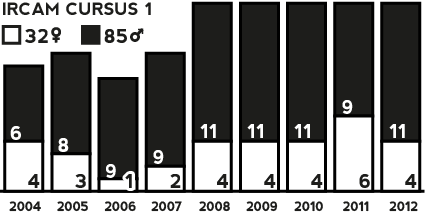
Over nine years, the mean female participation is 27%, once dropping as low as 10% (in 2006/07) and only twice hitting its peak of 40%.
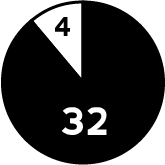 As a way of seeing how this is reflected in IRCAM’s public-facing programming, I counted up the composers being performed in IRCAM’s 2011/12 Paris season (without counting the Cursus 1 concerts at the end of this month). This programming is highly varied and includes young composers involved with Cursus 2 or the Tremplin project with Ensemble intercontemporain, as well as performances by various invited groups and composers in residence. Of 36 composers performed, 4 were women — 11%.
As a way of seeing how this is reflected in IRCAM’s public-facing programming, I counted up the composers being performed in IRCAM’s 2011/12 Paris season (without counting the Cursus 1 concerts at the end of this month). This programming is highly varied and includes young composers involved with Cursus 2 or the Tremplin project with Ensemble intercontemporain, as well as performances by various invited groups and composers in residence. Of 36 composers performed, 4 were women — 11%.
There are deep-rooted and complex reasons behind these disappointing figures, and I don’t wish to pin the blame solely on IRCAM for the imbalances — the apparent filtering out of women certainly begins much earlier in their career paths — but I do think it is important to raise awareness of these issues. The continued celebration of any cultural role — such as that of the composer, but an even more extreme case is that of the orchestral conductor — which appears to be systemically male-dominated is in need of scrutiny. I would be very interested to hear thoughts on how best these inequalities might be adressed or why the numbers look like they do.
In the meantime, International Women’s Day is about celebrating women’s achievements, so get listening to some of my talented colleagues Tatiana Catanzaro, Elvira Garifzyanova, Heera Kim, Diana Soh, Lisa Streich and Ying Wang, or if you have Spotify, plug yourself into Tim Rutherford-Johnson’s IWD-themed playlist.
Update, 10/03: Two people have suggested that perhaps female representation on Cursus 1 might correlate with the presence of women on the juries that select students. This seemed slightly dubious to me, but the archives also list jury members, so I was able to do some further analysis (PDF, 76kb). It shows no clear relationship between the two, but it does allow us to note that over the last nine years just 11% of the Cursus 1 jury members have been female.
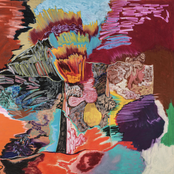
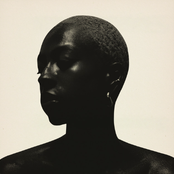
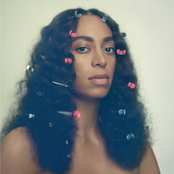

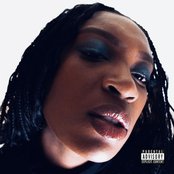

4 Comments
The numbers only reflect reality. it’s neither good nor bad,it just is. there are more male composers than female composers. In the western world,at least,that is.
In order for the research to be exact,we would have to know the percentages of men and women that applied for the ircam (or other things) in the first place.
saying that “only” 30% of selected composers are women and implying that this is “bad”, or “unjust” or anything else, is, in a way, ignoring some actual numbers that perfectly explain the situation.
Out of all the students, what is the percentage of undergraduate and graduate women studying composition in the world? is it 30%? it is certainly higher than it was 30 years ago, and that is why women composers get much more attention today than they did 30 years ago.
On the other hand: I was in a festival in South Korea five years ago,and the vast majority of local composers being performed were,in fact, female. This is also easy to explain,since there are way more women studying composition in Korea than there are men. is this good or bad? nor the one,or the other.it’s just the way it is, and there probably are reasons why it is as it is. see you in the studios
Nicolas: of course I am not implying that somehow the reading panels are actively discriminating, and a gender audit as used above is of its nature crude, but to state that this inequality ‘is just the way it is’, seems to me rather naïve. What is unjust is that many of the cultural roles that are held with the highest regard remain male-dominated. This means at various stages women are being excluded (from what are effectively positions of power). Not necessarily through active discrimination, but perhaps through discouraging experiences or a lack of role models at various points in their educations and careers, which is something that does need addressing.
Despite this, female composers continue to produce work of staggering genius, which we should also celebrate today.
i’ve seen other people say/write this:” but perhaps through discouraging experiences or a lack of role models “
a composer’s life if FILLED with discouraging experiences,so one should just deal with that,man or woman.it’s not always pretty,but it’s the same for everyone. the world is filled with people that will try to pull down a young aspiring artist,male or female.one just has to overcome,and get used to it. I don’t see how a discouraging experience is “discrimination”.
as far as role models are concerned,why should a woman composer look for another woman composer for inspiration (to become a composer)?it’s music that makes people want to be composers,not the fact that is was written by males or females. an enormous amount of women started playing basketball thanks to Michael Jordan,started writing music thanks to Bach or Stockhausen. it’s music that is (or should be) the driving force,not the sex of the maker.
again,if you look at the history if the ircam cursus,most women composers that had been selected,come from Asia. that could be explained in many ways (first of all, demographics).it does not mean that non-Asian female composers are discriminated against…
someone could even argue that female composers have discrimination in their favor, since there are a lot of competitions and call for scores addressed exclusively to them. that,in my mind, does not seem fair and is even rather demeaning to women, and I know many women composers that agree on that.
I’m not sure that this is a question of women composers. IRCAM is a scientific research facility, first and foremost, and as cool as music is, the science of it isn’t easy and typically requires a math or computer science background. Hey, I wrote a book on it, AND I’m a woman!
But, this is totally the reality, and it is strange. I’m about to enter a graduate program in musical acoustics, and don’t expect to meet many women there. My boss is a woman with many years of IRCAM under her belt and a fantastic role model for me. I went to Music Hack Day SF and there were only 2 other females there, and they were both software engineers by trade. Maybe, it occurred to me last night, women aren’t as interested in software programming as are men because (1) it takes a long time to learn (you basically have to go to college for it); (2) it seems like it will only get easier to learn, so let’s just wait; and (3) there’s a lot of competition, and they’re all men, and it’s confusing!
[Hey read my book! It’s called “Numbers and notes: An introduction to musical signal processing”. Starts with an overview of the physics of sound, musical instrument design, and psychoacoustics, and then travels to the digital realm with sampling and the fast Fourier transform! And code, speaking of the devil.]
Thanks for the interesting read!
Regina Collecchia
One Trackback
[…] Another small contribution comes from composer Chris Swithinbank, who has been taking a look at female representation at IRCAM. Share this:TwitterEmailPrintMoreFacebookDiggStumbleUponRedditLike this:LikeBe the first to like […]